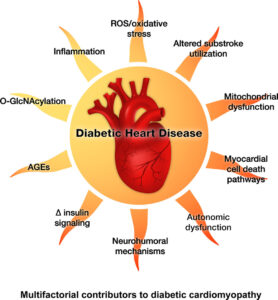Diabetes and cardiovascular diseases (CVD) are two of the most prevalent chronic health conditions worldwide. They often go hand in hand, creating a complex health challenge that requires comprehensive care. Individuals with diabetes are at a higher risk for developing heart disease and related conditions, making effective management of both critical for long-term health. In this article, we’ll explore the connection between diabetes and cardiovascular care, and discuss strategies for managing these conditions together to improve overall health outcomes.
1. Understanding the Diabetes-Cardiovascular Connection
Diabetes, particularly Type 2 diabetes, is closely linked to an increased risk of cardiovascular diseases, including coronary artery disease, heart failure, stroke, and peripheral artery disease. The reason for this connection is rooted in the way high blood sugar affects the blood vessels and heart.
When blood sugar levels are poorly controlled over time, they can damage blood vessels, leading to atherosclerosis (the buildup of fatty deposits in the arteries). This condition narrows and hardens the arteries, increasing the risk of heart attack, stroke, and other cardiovascular issues. Additionally, individuals with diabetes often have higher blood pressure and cholesterol levels, which further contribute to cardiovascular risks.

2. The Impact of High Blood Sugar on Heart Health
Chronic high blood sugar from uncontrolled diabetes has several effects on cardiovascular health:
- Inflammation: Elevated glucose levels can lead to inflammation within the blood vessels, which can accelerate the development of atherosclerosis.
- Thickening of Blood Vessel Walls: High glucose levels cause the walls of the blood vessels to thicken and stiffen, making it more difficult for blood to flow freely, and increasing the heart’s workload.
- Dysfunctional Endothelial Cells: The endothelial cells lining the blood vessels play a key role in maintaining healthy circulation. In people with diabetes, these cells may become damaged, leading to impaired vascular function and contributing to heart disease.
- Increased Blood Clotting: Diabetes increases the risk of blood clotting, which can block arteries and increase the chances of a heart attack or stroke.
The combination of these factors makes diabetes a major risk factor for developing cardiovascular problems.
3. Managing Both Conditions Simultaneously
Given the close relationship between diabetes and cardiovascular disease, managing both is critical for reducing the risk of complications. Here are key strategies for individuals with diabetes to protect their heart health:
a) Blood Sugar Control
The most fundamental aspect of diabetes management is keeping blood sugar levels within a target range. Consistently high blood sugar levels can wreak havoc on blood vessels, making it more difficult to manage cardiovascular risks. Patients should work with their healthcare providers to set individualized blood glucose targets and use lifestyle changes and medications to achieve them.
- Diet: A balanced diet rich in whole grains, lean proteins, healthy fats, and plenty of vegetables can help regulate blood sugar. Limiting processed foods and sugars is crucial in keeping blood sugar levels stable.
- Exercise: Regular physical activity helps improve insulin sensitivity, lower blood sugar levels, and reduce the risk of heart disease. Activities like walking, swimming, or cycling for at least 150 minutes per week are recommended.
- Medications: In addition to lifestyle changes, medications such as metformin, SGLT2 inhibitors, or GLP-1 receptor agonists may be prescribed to help manage blood sugar levels. Some of these medications also have protective effects on the heart and kidneys.
b) Managing Blood Pressure
High blood pressure is a common comorbidity in people with diabetes and can significantly increase the risk of cardiovascular events. Effective blood pressure management is essential for individuals with diabetes to reduce the risk of heart disease.
- Target Blood Pressure: The American Diabetes Association recommends aiming for a blood pressure of less than 140/90 mmHg. Achieving this may require lifestyle changes such as reducing sodium intake, increasing physical activity, and maintaining a healthy weight.
- Medications: Medications like ACE inhibitors, angiotensin II receptor blockers (ARBs), or calcium channel blockers may be prescribed to help manage blood pressure and provide additional heart protection.
c) Cholesterol Management
High cholesterol levels, especially elevated low-density lipoprotein (LDL) cholesterol, are common in people with diabetes and significantly increase cardiovascular risk. Managing cholesterol levels is another critical aspect of diabetes care.
- Diet and Lifestyle: Eating heart-healthy foods such as those rich in omega-3 fatty acids (found in fish like salmon), fiber (found in vegetables, fruits, and whole grains), and healthy fats (from nuts, seeds, and olive oil) can help reduce cholesterol levels.
- Statins and Other Medications: Statins are commonly prescribed to people with diabetes who are at high risk for cardiovascular events. These medications help lower LDL cholesterol levels and reduce the risk of heart disease and stroke.
d) Weight Management
Maintaining a healthy weight is an essential component of both diabetes and cardiovascular disease management. Being overweight or obese increases the risk of both conditions, but losing weight can help lower blood sugar levels, reduce blood pressure, and improve cholesterol levels.
- Healthy Weight Loss: A combination of a balanced diet and regular physical activity is the best approach to weight management. Even a modest weight loss of 5-10% of body weight can result in significant health benefits, including better blood sugar control and reduced cardiovascular risk.
4. Regular Monitoring and Checkups
Regular checkups are essential for managing diabetes and preventing or detecting cardiovascular complications early. Healthcare providers will typically monitor blood glucose, blood pressure, cholesterol levels, kidney function, and other cardiovascular risk factors regularly.
Individuals with diabetes should also be screened for signs of heart disease, including stress tests or imaging studies, if recommended by their healthcare provider. Keeping these conditions well-monitored helps ensure that any changes in health status are addressed promptly.
5. The Role of Diabetes Medications in Heart Health
Several newer classes of diabetes medications have been shown to have direct benefits for heart health. For example, SGLT2 inhibitors and GLP-1 receptor agonists not only help regulate blood sugar but also provide cardiovascular protection.
- SGLT2 inhibitors (such as empagliflozin and canagliflozin) help lower blood sugar by increasing glucose excretion in the urine, and studies have shown they can reduce the risk of heart failure and improve overall heart health.
- GLP-1 receptor agonists (such as liraglutide and semaglutide) help lower blood sugar, reduce body weight, and have been shown to reduce the risk of heart attacks and strokes in people with diabetes.
6. The Importance of Mental Health
Managing chronic conditions like diabetes and cardiovascular disease can take a toll on mental health. Anxiety, stress, and depression are common among individuals with chronic health issues, and they can make it harder to manage both diabetes and heart disease effectively.
It’s important to address mental health as part of a comprehensive care plan. Therapy, support groups, and medications can all play a role in helping individuals cope with the emotional challenges of living with chronic conditions.
Conclusion
Diabetes and cardiovascular disease are intricately connected, and individuals living with both conditions face an increased risk of serious health complications. However, with proactive management that includes blood sugar control, lifestyle changes, regular monitoring, and medication, it is possible to reduce the risks and improve overall health. By taking a holistic approach to care that addresses both diabetes and cardiovascular health, individuals can lead healthier, longer lives.
If you have diabetes or are at risk for it, make sure to work closely with your healthcare team to develop a comprehensive plan to protect your heart and maintain your well-being. Managing both diabetes and cardiovascular health is not only possible, but it is essential for improving quality of life and preventing long-term complications.
